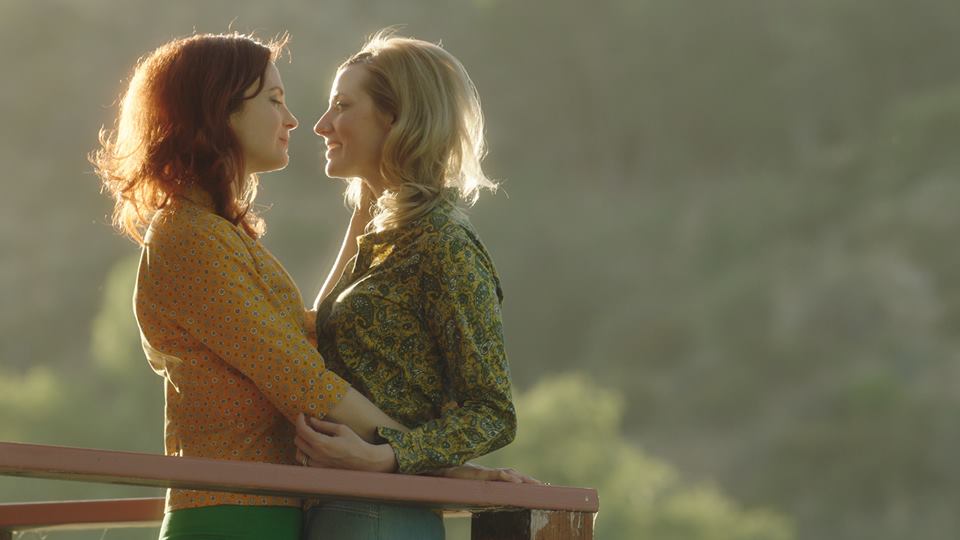Film Review: ‘Snapshots’
By Guy Lodge
LOS ANGELES (Variety.com) – Early on in “Snapshots,” an elderly matriarch announces to her visiting daughter and granddaughter that two topics of conversation are forbidden for the weekend: “what-ifs and politics.” It’s as sure a sign as any that those themes — identity politics in particular, with the red-blue kind more implied — will proceed to dominate Melanie Mayron’s earnest, gentle-hearted film, an across-the-generations ode to following your heart and living your truth. If that sounds corny, this reflection on an illicit affair between two young married women, and the familial reverberations it has decades later, isn’t shy of stating its case in bluntly homespun terms: One rather wishes Jan Miller Corran and Katherine Cortez’s evidently heartfelt script placed a little more trust in its actors (and audience) to connect the emotional dots.
As it is, “Snapshots” wallows a little too readily in cliché to be quite as stirring as its story — one drawn from Corran’s own family history — sounds on paper. The title’s a clue as to the melodramatic manner of proceedings: A shattering episode from the past of Rose (Piper Laurie), an 85-year-old widow living independently in an idyllic lake house, is dredged up with the discovery of previously unseen photos from her youth. Those once-carefree snapshots cue recurring flashbacks to the 1960s, where the young Rose (Shannon Collis) forges a friendship with neighboring free spirit Louise (Emily Goss) that gradually turns into a deeper, more passionate connection, hidden from their respective husbands and from society at large.
The script withholds the outcome of their affair until the denouement, though the present-day action makes it clear that, for Rose, those stolen moments of bliss have not led to a life lived out loud — even in notionally more liberated times, the persistence of prejudice has compelled her to keep her life’s greatest love to herself. Visited for the weekend by her daughter Patty (Brooke Adams), a conservative meddler embittered by her late husband’s philandering, and Patty’s adult daughter Allison (Emily Baldoni), a photographer going through marital upheaval of her own, she’s finally presented with a chance to share her secret — though this female family reunion turns out to be fraught with difference and dispute.
This would be substantial dramatic material even without the somewhat schematic parallels that Corran and Cortez forge between characters past and present. Splitting the trim (if none too pacy) running time more or less evenly between Rose’s current and former lives — both set on the same serenely sunlit lakeshore — leaves both ends of the narrative a little under-developed, rife with unanswered questions about the characters’ interior lives. Patty and Allison are particularly short on detail and dimension, their respective dilemmas emerging chiefly through ungainly chunks of expository dialogue; they operate less as complicated human figures than as symbolic embodiments of the opposing schools of social thought between which Rose has lived all her life.
Though they’re hampered by sketchy period detail, the flashback sequences are more satisfying, thanks in no small part to Collis’s vulnerable, best-in-show performance as the young Rose, a shy, uncertain wallflower gradually lit from within by desire as soulful as it is carnal. Meanwhile, if Goss’s radiant, flame-haired Louise seems a little too good to be true — a veritable machine of poetry-spouting joie de vivre — she makes sense as a figment of Rose’s past, wistfully edited and exaggerated by memory. (That might even excuse the fact that she gets the script’s most groansome lines: “As in, ‘A rose by any other name would smell as sweet!’” she chirrups after Rose introduces herself.)
Actress-turned-helmer Mayron’s few feature directing credits (“The Baby-Sitters Club” and “Slap Her, She’s French!” among them) are outweighed by her impressive small-screen résumé — including, most recently, multiple fast, funny episodes of the CW’s “Jane the Virgin.” (Series regular Brett Dier turns up in a supporting role as Louise’s boho husband.) “Snapshots” has little of that assignment’s, well, snap, but Mayron steers it in smooth, businesslike, generously lit fashion: It’s televisual, perhaps, but made with a certain modest awareness that the bulk of its audience will find it on VOD. Still, it’s hard not to think of Mayron’s breakout onscreen role in Claudia Weill’s 1978 feminist classic “Girlfriends,” a micro-indie that perceptively probed the intricacies of female friendship and life-building with indelible, everyday wisdom and humor. It’s that sense of real, rumpled life in between the dramatic pivots that’s missing from “Snapshots” — which, true to its title, offers only a passing glimpse of women quietly in crisis.

